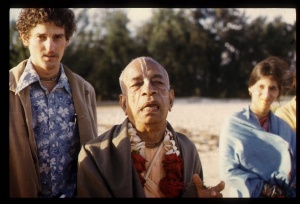CC Madhya 17.183 (1975): Difference between revisions
(Vanibot #0027: CCMirror - Mirror CC's 1996 edition to form a basis for 1975) |
(Vanibot #0020: VersionCompareLinker - added a link to the Version Compare feature) |
||
| Line 2: | Line 2: | ||
<div style="float:left">'''[[Sri Caitanya-caritamrta (1975)|Śrī Caitanya-caritāmṛta (1975)]] - [[CC Madhya (1975)|Madhya-līlā]] - [[CC Madhya 17 (1975)|Chapter 17: The Lord Travels to Vṛndāvana]]'''</div> | <div style="float:left">'''[[Sri Caitanya-caritamrta (1975)|Śrī Caitanya-caritāmṛta (1975)]] - [[CC Madhya (1975)|Madhya-līlā]] - [[CC Madhya 17 (1975)|Chapter 17: The Lord Travels to Vṛndāvana]]'''</div> | ||
<div style="float:right">[[File:Go-previous.png|link=CC Madhya 17.182 (1975)|Madhya-līlā 17.182]] '''[[CC Madhya 17.182 (1975)|Madhya-līlā 17.182]] - [[CC Madhya 17.184 (1975)|Madhya-līlā 17.184]]''' [[File:Go-next.png|link=CC Madhya 17.184 (1975)|Madhya-līlā 17.184]]</div> | <div style="float:right">[[File:Go-previous.png|link=CC Madhya 17.182 (1975)|Madhya-līlā 17.182]] '''[[CC Madhya 17.182 (1975)|Madhya-līlā 17.182]] - [[CC Madhya 17.184 (1975)|Madhya-līlā 17.184]]''' [[File:Go-next.png|link=CC Madhya 17.184 (1975)|Madhya-līlā 17.184]]</div> | ||
{{CompareVersions|CC|Madhya 17.183|CC 1975|CC 1996}} | |||
{{RandomImage}} | {{RandomImage}} | ||
==== TEXT 183 ==== | ==== TEXT 183 ==== | ||
<div class="verse"> | <div class="verse"> | ||
: | :'mūrkha'-loka karibeka tomāra nindana | ||
:sahite nā pārimu sei | :sahite nā pārimu sei 'duṣṭe'ra vacana | ||
</div> | </div> | ||
| Line 25: | Line 24: | ||
<div class="translation"> | <div class="translation"> | ||
"Foolish people will blaspheme You, but I shall not tolerate the words of such mischievous people." | |||
</div> | </div> | ||
| Line 32: | Line 31: | ||
<div class="purport"> | <div class="purport"> | ||
Śrīla Bhaktisiddhānta Sarasvatī Ṭhākura remarks that although the brāhmaṇa did not belong to a superior community, he fearlessly chastised so-called caste brāhmaṇas because he was situated on the platform of pure devotional service. There are people who are opposed to Śrī Caitanya | Śrīla Bhaktisiddhānta Sarasvatī Ṭhākura remarks that although the brāhmaṇa did not belong to a superior community, he fearlessly chastised so-called caste brāhmaṇas because he was situated on the platform of pure devotional service. There are people who are opposed to Śrī Caitanya Mahāprabhu's accepting a Vaiṣṇava belonging to a lower caste. Such people do not consider mahā-prasāda transcendental, and therefore they are described here as mūrkha (foolish) and duṣṭa (mischievous). A pure devotee has the power to challenge such high-caste people, and his brave statements are not to be considered proud or puffed up. On the contrary, he is to be considered straightforward. Such a person does not like to flatter high-class brāhmaṇas who belong to the non-Vaiṣṇava community. | ||
</div> | </div> | ||
Latest revision as of 10:36, 27 January 2020

A.C. Bhaktivedanta Swami Prabhupada
TEXT 183
- 'mūrkha'-loka karibeka tomāra nindana
- sahite nā pārimu sei 'duṣṭe'ra vacana
SYNONYMS
mūrkha-loka—foolish persons; karibeka—will do; tomāra nindana—blaspheming You; sahite nā pārimu—I shall not be able to tolerate; sei—those; duṣṭera vacana—words of mischievous persons.
TRANSLATION
"Foolish people will blaspheme You, but I shall not tolerate the words of such mischievous people."
PURPORT
Śrīla Bhaktisiddhānta Sarasvatī Ṭhākura remarks that although the brāhmaṇa did not belong to a superior community, he fearlessly chastised so-called caste brāhmaṇas because he was situated on the platform of pure devotional service. There are people who are opposed to Śrī Caitanya Mahāprabhu's accepting a Vaiṣṇava belonging to a lower caste. Such people do not consider mahā-prasāda transcendental, and therefore they are described here as mūrkha (foolish) and duṣṭa (mischievous). A pure devotee has the power to challenge such high-caste people, and his brave statements are not to be considered proud or puffed up. On the contrary, he is to be considered straightforward. Such a person does not like to flatter high-class brāhmaṇas who belong to the non-Vaiṣṇava community.